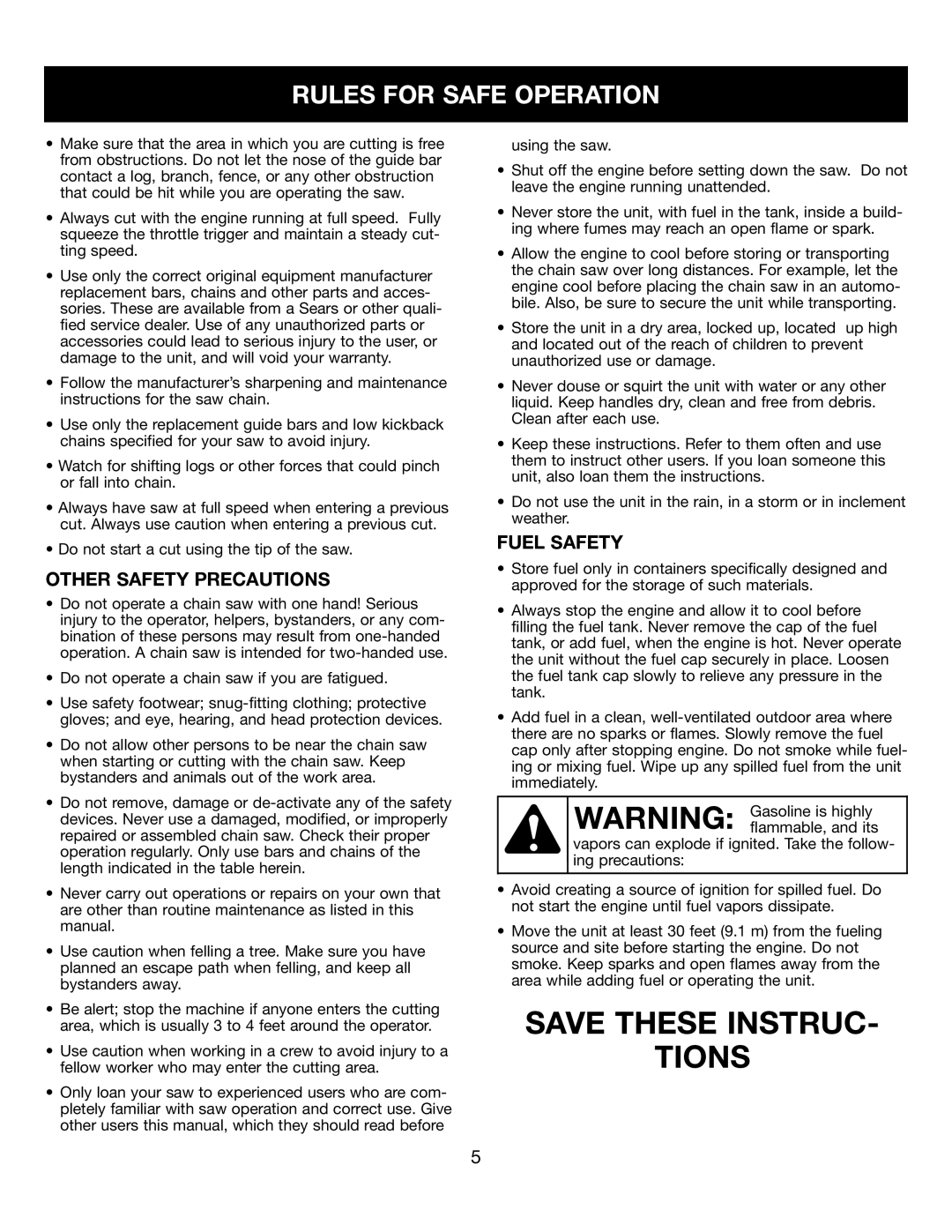•Make sure that the area in which you are cutting is free from obstructions. Do not let the nose of the guide bar contact a log, branch, fence, or any other obstruction that could be hit while you are operating the saw.
•Always cut with the engine running at full speed. Fully squeeze the throttle trigger and maintain a steady cut- ting speed.
•Use only the correct original equipment manufacturer replacement bars, chains and other parts and acces- sories. These are available from a Sears or other quali- fied service dealer. Use of any unauthorized parts or accessories could lead to serious injury to the user, or damage to the unit, and will void your warranty.
•Follow the manufacturer’s sharpening and maintenance instructions for the saw chain.
•Use only the replacement guide bars and low kickback chains specified for your saw to avoid injury.
•Watch for shifting logs or other forces that could pinch or fall into chain.
•Always have saw at full speed when entering a previous cut. Always use caution when entering a previous cut.
•Do not start a cut using the tip of the saw.
OTHER SAFETY PRECAUTIONS
•Do not operate a chain saw with one hand! Serious injury to the operator, helpers, bystanders, or any com- bination of these persons may result from one-handed operation. A chain saw is intended for two-handed use.
•Do not operate a chain saw if you are fatigued.
•Use safety footwear; snug-fitting clothing; protective gloves; and eye, hearing, and head protection devices.
•Do not allow other persons to be near the chain saw when starting or cutting with the chain saw. Keep bystanders and animals out of the work area.
•Do not remove, damage or de-activate any of the safety devices. Never use a damaged, modified, or improperly repaired or assembled chain saw. Check their proper operation regularly. Only use bars and chains of the length indicated in the table herein.
•Never carry out operations or repairs on your own that are other than routine maintenance as listed in this manual.
•Use caution when felling a tree. Make sure you have planned an escape path when felling, and keep all bystanders away.
•Be alert; stop the machine if anyone enters the cutting area, which is usually 3 to 4 feet around the operator.
•Use caution when working in a crew to avoid injury to a fellow worker who may enter the cutting area.
•Only loan your saw to experienced users who are com- pletely familiar with saw operation and correct use. Give other users this manual, which they should read before
using the saw.
•Shut off the engine before setting down the saw. Do not leave the engine running unattended.
•Never store the unit, with fuel in the tank, inside a build- ing where fumes may reach an open flame or spark.
•Allow the engine to cool before storing or transporting the chain saw over long distances. For example, let the engine cool before placing the chain saw in an automo- bile. Also, be sure to secure the unit while transporting.
•Store the unit in a dry area, locked up, located up high and located out of the reach of children to prevent unauthorized use or damage.
•Never douse or squirt the unit with water or any other liquid. Keep handles dry, clean and free from debris. Clean after each use.
•Keep these instructions. Refer to them often and use them to instruct other users. If you loan someone this unit, also loan them the instructions.
•Do not use the unit in the rain, in a storm or in inclement weather.
FUEL SAFETY
•Store fuel only in containers specifically designed and approved for the storage of such materials.
•Always stop the engine and allow it to cool before filling the fuel tank. Never remove the cap of the fuel tank, or add fuel, when the engine is hot. Never operate the unit without the fuel cap securely in place. Loosen the fuel tank cap slowly to relieve any pressure in the tank.
•Add fuel in a clean, well-ventilated outdoor area where there are no sparks or flames. Slowly remove the fuel cap only after stopping engine. Do not smoke while fuel- ing or mixing fuel. Wipe up any spilled fuel from the unit immediately.
WARNING: Gasoline is highly flammable, and its
vapors can explode if ignited. Take the follow- ing precautions:
•Avoid creating a source of ignition for spilled fuel. Do not start the engine until fuel vapors dissipate.
•Move the unit at least 30 feet (9.1 m) from the fueling source and site before starting the engine. Do not smoke. Keep sparks and open flames away from the area while adding fuel or operating the unit.
SAVE THESE INSTRUC-
TIONS

